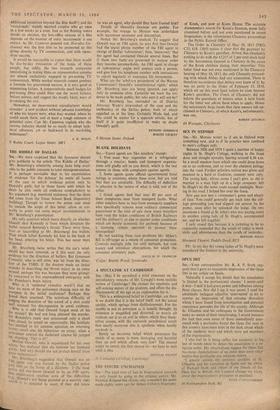A SPECTATOR AT CAMBRIDGE SIR,—May I be permitted a brief
comment on the introductory remarks of Mr. Lysaght's most realistic review of Cambridge? He stresses the apathetic and self-seeking nature of the students, and offers the dis- illusionment of the age as an explanation for it.
This is a widespread belief in Cambridge, yet there is no doubt that it is the belief itself, not the actual apathy, which springs from disillusionment. For the apathy is not as prevalent as is usually thought; its existence is magnified and distorted, as nearly all students see it as an evil in others which they them- selves escape, with the curiously paradoxical result that nearly everyone else is apathetic when hardly anybody is.
Surely an incorrect belief which permeates the minds of so many is more damaging and harmful than an evil which affects very few? The second might be cured; the first cannot be—we have to wait until it dies.


































 Previous page
Previous page